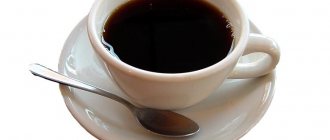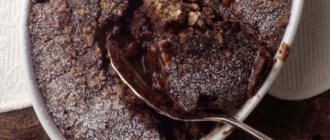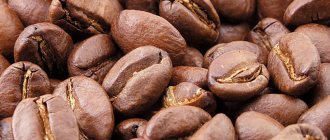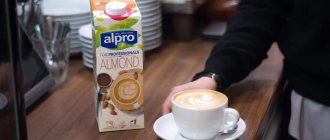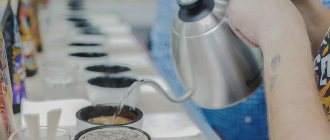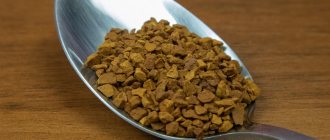Can you drink coffee while on a diet?
Coffee for losing weight: friend or foe? This question haunts everyone who has decided to lose a couple of kilograms. Coffee has a complex effect on the body, including the digestive system. How does coffee affect appetite, satiety and weight loss?
Coffee reduces the feeling of hunger, and for many it completely suppresses the appetite.
This effect is explained by the ability of caffeine to break down glycogen from liver reserves. They represent reserves of bound glucose, the body's energy reserve. Coffee breaks down glycogen and releases glucose, which enters the blood. The brain receives a signal that the body is full of energy and does not need food yet, so appetite disappears.
The opinion that coffee promotes the breakdown of fats is only partly true.
Coffee can actually help actively burn fat during training, giving your muscles more energy and endurance. But coffee itself does not burn fat, so don’t expect extra centimeters from your sides and belly by increasing the caffeine dose.
Why is it believed that you should not drink coffee when losing weight?
Some people claim that coffee's active effect on digestion makes you feel hungry faster. Coffee actually helps digestive processes due to the content of chlorogenic acid in the drink. It stimulates the secretion of secretions by the walls of the stomach, necessary for the breakdown of proteins. Coffee helps better digestion of meat, eggs, milk and other protein products, but does not have the ability to dramatically increase the speed of digestion. Therefore, the claim that the drink promotes food processing so quickly that it causes early hunger has no basis.
Some time ago, Hollywood women noticed that coffee suppressed appetite, and began to appear everywhere with cups of coffee, reducing their cravings for food. Brisk journalists gave this phenomenon the name “Starbucks Diet.”
The property of coffee to reduce appetite should be used carefully so as not to disturb digestion. Drinking coffee instead of a snack is perfectly acceptable, but it should not replace a meal. Abuse of coffee and refusal to eat cause serious problems of the gastrointestinal system.
How does coffee affect weight loss?
Coffee is actively used by those who struggle with excess weight. Coffee's assistance in weight loss can be quite significant.
- Coffee reduces daily calorie intake.
- Coffee helps you stay within the recommended diet.
- Coffee supplies the body with energy, which many dieters lack due to limited calorie intake.
- Coffee improves muscle endurance before exercise.
- Has a diuretic effect.
The beneficial properties of coffee for losing weight should not lead to abuse of the drink. Even if you adhere to a strict diet, you should not exceed the limit recommended by doctors. It is 5-7 cups of coffee. Since the body, under conditions of calorie restriction, becomes especially sensitive to the effects of food, you should not drink coffee later than 17-18 hours, so as not to disrupt the quality of night's rest.
They say coffee causes cancer. Or does it still prevent it?
There is no clear answer here either. And in short, you shouldn’t be afraid of coffee, but you also don’t need to drink it specifically to “prevent” cancer.
For example, the British National Medical Service reports a truly high-quality and reliable study by Japanese scientists who found that drinking even one cup of coffee a day can reduce the risk of developing cancer of the oral cavity and esophagus. That is, some (it is not clear which) components of coffee may have a protective effect on the oral cavity and esophagus. However, an important caveat: the study was only conducted in Japan, where the composition and method of preparing/consuming coffee may differ from other countries. That being said, the best way to reduce the risks of this type of cancer is not by drinking coffee at all, but still by quitting smoking and alcohol (the main risk factors for this type of cancer).
In most cases, it is impossible to say that there is a reliable connection between coffee consumption and the risk of cancer. In general (but not always), people who drink coffee have a lower risk of disease and early death than those who don't drink coffee. However, it is not known whether it is coffee that helps them in this or whether they can drink it calmly because they are initially in good health.
Therefore, to the question “Is it worth drinking coffee to reduce the risk of disease and live longer” the answer is unequivocal - no. Should moderate coffee consumption be a concern due to cancer risks? No.
How many calories are in coffee
How much coffee can a person losing weight afford without going beyond their daily diet?
The answer depends on the coffee recipe. The safest for your figure is natural coffee without added sugar or milk. A 45-50 ml serving of espresso contains 2 calories. Every 20 ml of milk increases the calorie content of the drink by 10 kcal, and a spoonful of sugar adds another 20. Table. Calorie content of the most popular coffee drinks
| Recipe name | Calorie content 100 ml (kcal) | Traditional serving volume (ml) | Calorie content per serving (kcal) |
| Espresso | 4 | 50 | 2 |
| Espresso with milk and sugar | 40 | 50 | 20 |
| Oriental coffee | 4 | 120 | 5 |
| Oriental coffee with sugar (1 tsp per serving) | 20 | 120 | 25 |
| Cappuccino | 36 | 150 | 54 |
| Cappuccino with sugar (1 tsp per serving) | 50 | 150 | 74 |
| Latte | 40 | 250 | 110 |
| Latte with sugar (2 tsp per serving) | 60 | 250 | 150 |
| Flat white | 40 | 180 | 72 |
| Flat white with sugar (1 tsp per serving) | 50 | 180 | 92 |
| Instant coffee | 7 | 200 | 14 |
| Instant coffee with sugar (2 tsp per serving) | 27 | 200 | 54 |
The calorie content of the recipes is calculated taking into account the use of milk with a fat content of 2.5%. If you add cream or full-fat milk to your coffee, the nutritional value of the drink will increase. The use of skim milk, on the contrary, reduces calorie content.
Natural coffee without milk and sugar is the safest for diet.
Types of coffee and calorie content
Can't live a day without a cappuccino or latte? Are you used to always pampering yourself with your favorite drink? Then know that your drink is practically your dessert! Don't believe me? See for yourself:
As you can see, the most insidious coffee drinks are cold ones, which you just want to drink during the hot season. This creates the feeling that you are drinking something light and low-calorie, but in fact you are getting a significant portion of calories. And if you add the smallest dessert to some drink, you get the calories of a full lunch or dinner. Remember that even one chocolate candy contains from 50 to 70 calories!
Another important nuance is that the calorie content of these drinks can vary depending on the fat content of the ingredients, so it is very difficult to calculate the exact calorie content of the drink if you are not preparing it at home.
What kind of coffee can you drink while losing weight?
What popular drink recipes are diet-friendly?
Coffee with milk for weight loss
You can afford it provided that the milk is low fat. Milk with a fat content of 0.5-1% will most reliably protect you from excess calories. Avoid sugar; it is not a dietary product.
Instant coffee for weight loss
Its calorie content is low, but its effect on the stomach and digestive system is much more severe than natural coffee. If you drink instant coffee on an empty stomach, it can cause irritation of the mucous membrane, which can lead to the development of gastritis or exacerbation of chronic stomach diseases.
Espresso coffee for weight loss
Safest for diet. Contains a minimum of calories, gives vigor and a surge of energy. Its positive influence is especially felt in the first half of the day. A cup of espresso will invigorate you, warm you up, reduce your appetite, and all this positive energy will cost you only 2 kcal.
Coffee diets help you lose weight
Attention to contraindications
The dietary properties of coffee are based on its ability to burn fat, as we described above. Nutritionists note increased production of gastric juice. And this is one of the reasons why a drink made from coffee beans should not be drunk on an empty stomach.
When preparing diets, the diuretic properties of coffee and the effect on metabolism are taken into account. Individual physical activity also influences whether a person loses weight on a coffee diet or not.
If you have heart disease, ulcers or hypertension, you should drink the drink with caution. And for people with an unbalanced psyche, completely abandon coffee-based diets in order to avoid nervous disorders.
Everything written below is for informational purposes and before using any remedies or diets, you should consult your doctor.
Three day diet
This strict, effective diet involves drinking coffee and dark chocolate for three days. It is prohibited to add sugar, sweeteners and any other sweeteners to the drink, as well as milk, cream, syrups, high-calorie and sugar-containing products.
The chocolate consumed must contain a high percentage of cocoa (at least 50%). Every day you should drink up to 4 cups of espresso (100 ml each) and up to 150 g of dark chocolate. It is recommended to drink at least 2 liters of still water per day.
Seven-day diet with dark chocolate
Designed for 7 days, this diet is less strict and allows you to consume low-fat and low-calorie foods in small quantities.
Every day you need to drink no more than 4 hundred gram cups of strong coffee without additives and eat 150-160 g of dark chocolate.
Two week diet
It is recommended to consume dark chocolate (150 g) and 3 cups (100 ml) of espresso every day for two weeks. The diet includes 300 g of lean meat, one fruit (preferably an apple or orange) and dietary crispbread instead of bread (8-10 pieces).
Is it possible to lose weight on coffee without sugar and why?
Sugar is a high-calorie product, due to which the nutritional value of the drink increases significantly. Glucose increases appetite, as a result of which a person will want to eat after sweet espresso.
If you follow a proper diet, which includes a cup of coffee without sugar, you can lose weight.
Is it possible to lose weight on coffee with milk, and in what cases?
Espresso with full-fat milk or cream will not help anyone lose weight, but just the opposite.
But if you add skim milk to it, this is possible. With lactose-free milk, you can not only give the drink a pleasant taste, but also improve its beneficial properties.
Diet on coffee with milk
This diet lasts about a week. During it, you should drink up to 3 cups of espresso with skim milk a day, eat lean meat without salt and spices, as well as fresh fruits and vegetables.
Here are approximate proportions per day:
- Breakfast – chicken fillet without salt (up to 300 g), a cup (100 ml) of unsweetened espresso with milk.
- Lunch – vegetable salad without salt and oil (200 g), or green apple, boiled egg, espresso.
- Afternoon snack – apple, espresso.
- Dinner – carrot and herb salad (200 g).
Green Coffee Diet
This is a gentle diet, if followed correctly, a person will lose weight slowly. The diet includes green coffee. You can read more about its properties in the article “What is green coffee”.
The diet lasts a month. A person can eat fruits, vegetables, lean meats, and low-calorie foods.
Menu for the day:
- Breakfast – 2 boiled eggs, a cup of green coffee (100-150 ml).
- Snack – apple.
- Lunch – chicken broth, vegetable salad, boiled chicken fillet (up to 150 g), a cup of green coffee.
- Afternoon snack – fruits, vegetables, a cup of drink.
- Dinner – boiled fish fillet (up to 200 g), vegetable salad.
Such a diet not only helps to lose weight, but also cleanses the body of toxins and harmful substances, improves the condition of the stomach and skin.
Does green coffee help you lose weight?
A drink made from unroasted coffee beans became extremely popular several years ago among those who want to lose a few extra pounds. People bought low-grade grains for crazy money, which, according to the promises of clever sellers, help to lose weight. This property has not been confirmed by any serious study, with the exception of one in which 16 people participated! Unfortunately, the dubious qualities of green coffee and its components are confirmed by much more serious observations.
For example, sellers claim that green coffee contains more pure chlorogenic acid than roasted beans, and thereby activates digestion. But excess chlorogenic acid in food contributes to weight gain due to the formation of the most dangerous type of fat accumulation - visceral fat. This was confirmed by the experiments of the Western Australian Institute of Medical Research. In addition, chlorogenic acid does not disappear in roasted grains, but passes into other forms.
A separate topic can be devoted to unfounded and sometimes dangerous stereotypes about green coffee, but one thing can be said with reasonable certainty: green coffee does not help you lose weight.
Coffee and proper nutrition
It’s not for nothing that they say that if the day is not going well in the morning, then it won’t get better until the evening. Of course, this is a simple superstition, but for many people the morning is a time for entire rituals that allow them to prepare for the work day and get involved in work. The most popular is a cup of strong aromatic coffee. But do healthy eating enthusiasts support such a drink?
There are different types of coffee
Let's start with the fact that coffee can be of two main types - natural and instant. It would be a stretch for true connoisseurs of the invigorating drink to call the latter the word “coffee.” As a result of extraction and sublimation (terrible processes that make it possible to achieve a dry state), coffee loses its beneficial properties (it turns out there are many of them) and the lion’s share of caffeine. So let's leave it for coffee-flavored water lovers and turn our attention to a natural drink. There can be a great variety of varieties, types and preparation options. A whole book could be written about its classification alone.
